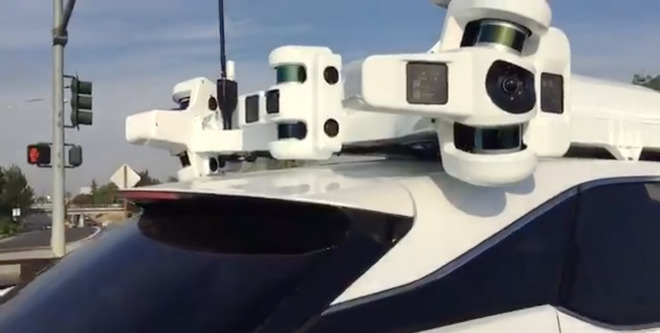As anticipated, the California Department of Motor Vehicles on Monday received approval from the California Office of Administrative Law to enact a set of regulations that will allow companies to test remotely operated autonomous vehicles on public roads.
Under the DMV's public testing framework, car and tech companies looking to test their respective autonomous vehicle technology can deploy test beds without a driver behind the wheel, reports The Sacramento Bee. The regulations go into effect on April 2.
As previously reported, California's new guidelines replace human operators with so-called "remote" drivers, or technicians who monitor car functions from a remote location. Operators are required to maintain a communications link with test vehicles at all times and, if things go awry, assume "immediate physical control" of the car, according to the adopted regulations (PDF link).
Aside from rules covering basic driving functionality, companies must set up and maintain a remote driver training program, submit for driving permits, notify local authorities of testing and more. One stipulation demands companies provide evidence that they can cover potential damages claims, which includes property damage and death arising from autonomous vehicle operation, of $5 million.
Of note, manufacturers looking to operate one or more autonomous vehicles must create a law enforcement interaction plan that provides instructions on how to contact a remote driver, ensure the car's autonomous mode is disengaged and safely move the vehicle out of traffic. The action plan also requires companies to furnish a description of the test vehicle's operational design.
"This is a major step forward for autonomous technology in California," DMV Director Jean Shiomoto said in a prepared statement. "Safety is our top concern and we are ready to begin working with manufacturers that are prepared to test fully driverless vehicles in California."
With at least 27 self-driving Lexus testbeds — with human operators — rolling on California roads, Apple is thought to be among those companies ready to take the next step toward a driverless future.
Apple kicked off its autonomous vehicle testing program with just three heavily modified Lexus RX450h hybrids last year. Last August, the tech giant upgraded to newer versions of the SUV and outfitted those cars with updated sensor equipment including advanced LiDAR and GPS hardware.
Apple's Autonomous Vehicle Tester (AVT) Program is a continuation of efforts to build a branded self-driving car under the "Project Titan" initiative. Dating back to at least 2015, Titan was a massive undertaking that saw more than 1,000 employees working on various projects spread across multiple Apple facilities. The initiative was ultimately shelved in late 2016 after it hit a number of major obstacles.
During the intervening months, Apple refocused efforts from a full-fledged branded vehicle to concentrate on self-driving software and supporting hardware. What Apple plans to do with the resulting technology is unknown, though rumors last year claim the company is planning to launch an experimental autonomous shuttle service for employees dubbed the Palo Alto to Infinite Loop, or PAIL.
 Mikey Campbell
Mikey Campbell







-m.jpg)






 Brian Patterson
Brian Patterson
 Charles Martin
Charles Martin


 Malcolm Owen
Malcolm Owen
 William Gallagher
William Gallagher
 Christine McKee
Christine McKee
 Marko Zivkovic
Marko Zivkovic







12 Comments
It'll be interesting to see how Apple ties iPhones to securely unlock its autonomous cars.
Reliable and secure face recognition will also give Apple a security advantage in autonomous systems.
iCloud integration?
We are living in interesting times folks.
Yes, this is going to be very interesting. Looks like I'm going to be an unwilling beta tester. Just hope they don't show up near me.
There seems to be a plethora of unique efforts in the quest to get an autonomous platform on the road today. When will we see a consolidation of programs that will truly define the future of the industry. At this point, Apple probably isn't behind at all. They just don't reveal their development victories because they don't need the publicity to get funding. With the stroke of a pen, they can advance their program in a California second.
The known leaders in this area are GM and Waymo.
Still, though, I certainly wouldn’t count Apple out of this race. I keep thinking that Apple’s advantage might be the combination of software with custom silicon — that is, a fully integrated stack. That’s their advantage with everything else, and this is an area where I can imagine total control and integration could be advantageous.
Apple could simply just be flying under the radar with this. Thats not a bad thing either. Apple is spending a ton of money on R&D for something and its not just a new SmartSpeaker or a new Mac Pro. Apple could really come out and surprise everyone with something. As with anything they get their hands on, never count Apple out.